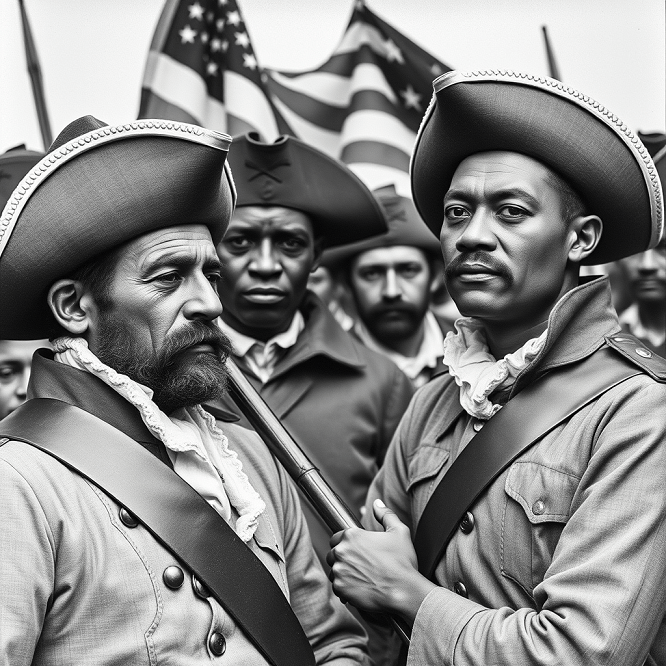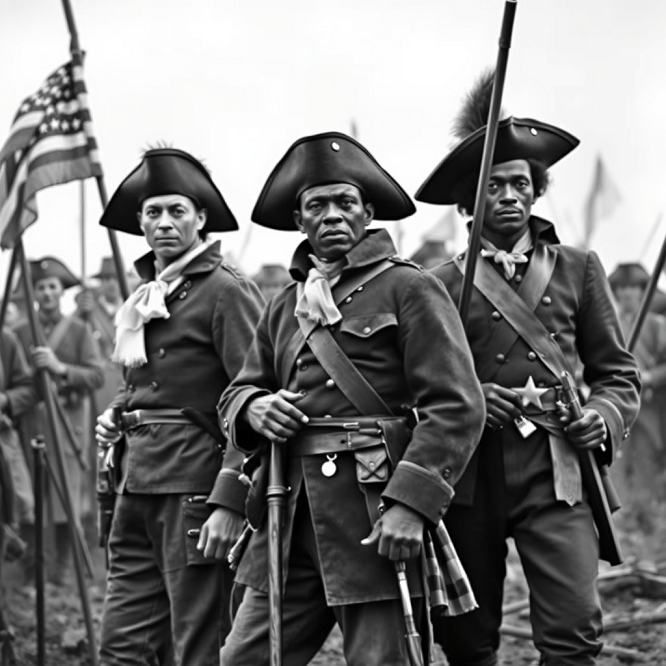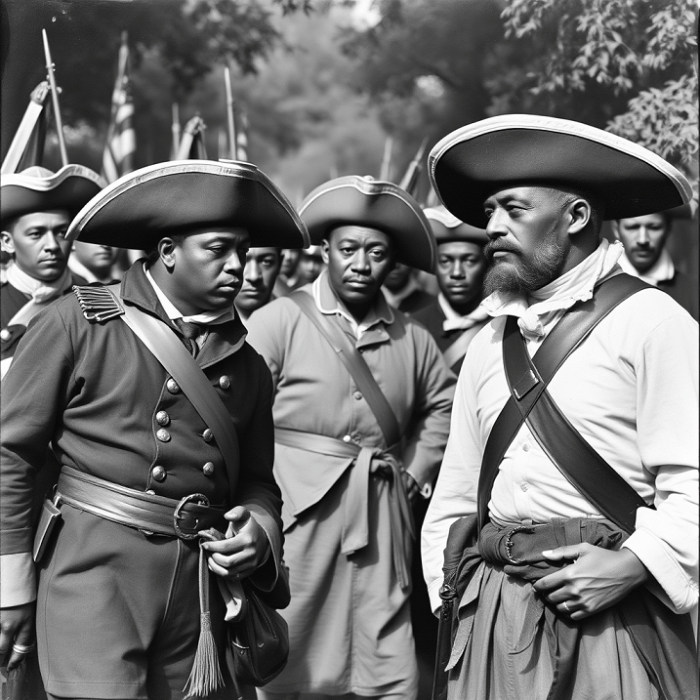African Americans played significant roles in the Revolutionary War. African American patriots fought for independence, serving in the Continental Army, militias, and as sailors in the Continental Navy. They participated in key battles, such as Bunker Hill and Yorktown.
Many enslaved Africans sought freedom by joining the British forces, lured by promises of emancipation through Lord Dunmore’s Proclamation. Others remained loyal to the American cause, hoping for liberty post-victory. The fate of Black Loyalists was varied; many were resettled in Nova Scotia or Sierra Leone after the war.
African Americans also served as spies, gathering crucial intelligence for both sides. Caribbean soldiers of African descent and other combatants with African ancestry contributed to the war effort. African American women supported the war through various roles, from cooking to poetry. Despite their contributions, African Americans faced continued oppression, with the promise of freedom largely unfulfilled.
Also Read: What Did America Gain From The Spanish-American War
The Role of African American Patriots in Key Revolutionary War Battles
African American patriots fought in crucial Revolutionary War battles. At Bunker Hill, Peter Salem, a former slave, gained recognition for his bravery. At the Battle of Saratoga, African Americans served in integrated units, contributing to the American victory.
James Armistead Lafayette, a Black spy, played a critical role in the Yorktown campaign by providing intelligence that led to the British defeat. These contributions helped shape the course of the war, although African American patriots did not see the widespread freedom they had hoped for, with many returning to lives of servitude.
Also Read: Did African American Fight in the Mexico American War
African American Sailors and Their Contributions to Revolutionary Naval Warfare
African American sailors were vital to Revolutionary naval warfare. Many served on Continental Navy ships and privateers, enduring harsh conditions and engaging in dangerous combat.
Black sailors like James Forten contributed significantly by manning cannons, navigating ships, and participating in boarding actions against British vessels.
Their maritime expertise and bravery were essential in disrupting British supply lines and securing American victories at sea. Despite their contributions, these sailors often faced discrimination, with little recognition or reward for their service after the war.

The Fate of Black Loyalists After the Revolutionary War
Black Loyalists, African Americans who sided with the British during the Revolutionary War, faced uncertain futures after the conflict. Many were evacuated by the British to Nova Scotia, where they encountered harsh conditions, broken promises of land, and racial discrimination.
Some eventually resettled in Sierra Leone, where they hoped to build new lives, though challenges persisted. In the Caribbean, other Black Loyalists were re-enslaved or faced economic hardship.
The promises of freedom and land by the British were largely unfulfilled, leaving many Black Loyalists to navigate difficult post-war realities.
Enslaved Africans Seeking Freedom Through Military Service
During the Revolutionary War, many enslaved Africans sought freedom by joining either the British or American forces. The British, through proclamations like Lord Dunmore’s, offered freedom to slaves willing to fight against the American colonists.
Thousands of enslaved Africans joined the British in hopes of gaining liberty. Some fought for the Continental Army, hoping their service would lead to emancipation.
These individuals played significant roles as soldiers, laborers, and spies. However, the promises of freedom were often broken, with many returning to slavery after the war, especially those who served with the American forces.
Also read: Did African American Fight in the Mexico American War

Prominent African American Figures of the Revolutionary War Era
Prominent African Americans significantly impacted the Revolutionary War era. Crispus Attucks, a runaway slave, became the first casualty of the American Revolution in the Boston Massacre.
Peter Salem, another former slave, was credited with killing British Major John Pitcairn at Bunker Hill. James Armistead Lafayette, a Black spy, gathered crucial intelligence that led to the American victory at Yorktown.
Wheatley, an enslaved poet, used her writings to support the revolutionary cause. These figures, despite their contributions, often faced continued discrimination and oppression, with their roles in the war largely underrecognized in history.
The Impact of Lord Dunmore’s Proclamation on African American Enlistment
Lord Dunmore’s Proclamation, issued in 1775 by the royal governor of Virginia, significantly impacted African American enlistment during the Revolutionary War. It promised freedom to enslaved Africans who escaped their Patriot masters and joined the British forces.
Thousands of enslaved individuals took this opportunity, fleeing to British lines in hopes of securing their freedom. The proclamation created tension between the Patriots and the British, as it threatened the institution of slavery.
However, the promise of freedom was not always honored, and many of those who joined the British were later re-enslaved or faced harsh conditions in refugee camps.
African Americans in the Continental Army: Integration and Segregation
African Americans served in the Continental Army, experiencing both integration and segregation. Initially, Black soldiers fought alongside white soldiers in integrated units.
As the war progressed, policies shifted, and some states created segregated units or banned Black enlistment altogether. Despite these challenges, African Americans played crucial roles in major battles and endured the same hardships as their white counterparts.
Their participation was driven by the hope of freedom and equality, yet many were disappointed as they returned to lives of slavery or faced racial discrimination after the war, with the promises of liberty largely unfulfilled.

Contributions of African American Women During the Revolutionary War
African American women made significant contributions during the Revolutionary War, despite their marginalized status. Women like Phillis Wheatley used their literary talents to inspire the revolutionary cause, while others, such as laundresses, cooks, and nurses, provided essential support to the Continental Army.
Some, like Deborah Sampson, disguised themselves as men to fight in the war, although records of African American women doing so are rare. Enslaved women also played crucial roles, from gathering intelligence to supporting Loyalist forces.
Despite their contributions, African American women remained largely unrecognized and continued to face oppression in post-war America.
The Involvement of Caribbean Soldiers of African Descent in the Revolution
Caribbean soldiers of African descent played a vital role in the Revolutionary War, particularly in the Southern campaigns. Many were free men or enslaved individuals brought by British forces from the Caribbean colonies.
These soldiers, known for their resilience and combat skills, participated in key battles, including the Siege of Savannah and the defense of British-held Charleston. Their involvement demonstrated the global reach of the conflict and the interconnectedness of the Atlantic world.
Despite their contributions, these soldiers often faced harsh conditions, limited recognition, and uncertain futures, with many returning to the Caribbean to continue lives of servitude.
Post-War Lives and Legacies of African American Veterans
African American veterans of the Revolutionary War faced diverse post-war realities. Some, like James Armistead Lafayette, were granted freedom and modest pensions for their service.
However, many returned to slavery or faced economic hardship and racial discrimination, despite their contributions to American independence. Free Black veterans often struggled to gain recognition and support from the government, with limited access to the benefits promised to white soldiers.
Their legacies, however, endured in the narratives of resistance and perseverance that inspired future generations, contributing to the long struggle for civil rights and equality in the United States.
African American Spy Networks and Intelligence Gathering Efforts
African American spy networks played crucial roles in intelligence gathering during the Revolutionary War. Black spies, such as James Armistead Lafayette, infiltrated British lines, gathering vital information that directly impacted military strategies and outcomes, including the decisive victory at Yorktown.
African Americans, due to their often-overlooked status, were able to move between enemy lines with relative ease, providing valuable intelligence to the Patriots.
These networks operated covertly, using enslaved and free African Americans to relay information. Despite their critical contributions, the efforts of African American spies were often unrecognized, and many returned to obscurity after the war.
The Participation of Free Blacks Versus Enslaved Blacks in the Revolutionary War
The participation of free Blacks versus enslaved Blacks in the Revolutionary War differed in motivations and experiences. Free Blacks enlisted in the Continental Army or served as sailors, driven by a sense of patriotism and the hope for better social standing.
They often fought in integrated units, though they still faced racial prejudice. Enslaved Africans, on the other hand, were motivated by the promise of freedom, either by fighting for the British, who offered emancipation, or the American forces.
Their experiences varied, with many facing broken promises and returning to slavery, despite their service and sacrifices during the war.
African American Contributions to Revolutionary War Naval Innovations
African Americans contributed significantly to naval innovations during the Revolutionary War. As sailors, they participated in the development of new naval tactics and technologies, such as the use of small, fast ships for privateering against British vessels.
Black shipbuilders and craftsmen were instrumental in constructing and maintaining the naval fleet, applying their skills in carpentry, rope-making, and sail-making.
These contributions helped to sustain the Continental Navy and privateer efforts, disrupting British supply lines and boosting American morale.
Despite their critical roles, African American contributions to naval warfare remained largely unrecognized, with limited acknowledgment of their innovations and sacrifices.
Also Read: http://10-facts-black-patriots-american-revolution
Early Acts of African American Defiance Leading to the Revolution
Early acts of African American defiance contributed to the revolutionary spirit in the colonies. Enslaved Africans and free Blacks resisted their oppression through various forms of rebellion, from running away and forming maroon communities to participating in slave uprisings.
Events like the Stono Rebellion and other insurrections highlighted the desire for freedom and equality, challenging the colonial system of slavery.
These acts of defiance created an undercurrent of resistance that influenced the broader revolutionary movement, inspiring both fear and admiration among colonists.
African American resistance laid the groundwork for their involvement in the Revolutionary War, demonstrating their commitment to liberty.